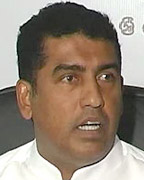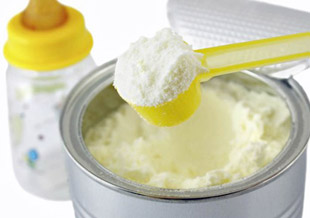|
Milk powder crisis:
Govt to get tough
By Kurulu Kariyakarawana
Milk powder is an essential requisite for Sri Lankans. It is a part
and parcel of the Sri Lankan tea drinking habit. Amidst the Government's
effort to wean the people away from depending on milk powder to fresh
milk like in the western countries, the necessity for powdered milk is
still considered an essential ingredient to those who could afford to
purchase it.
Like the controversial incidents reported in the recent past where
certain top rung milk powder importing companies were temporarily barred
due to chemical substances allegedly found in the powder, the latest woe
is over the shortage of products in the market.
 |
Minister of
Co-operatives and Internal Trade
Johnston Fernando |
 |
Chairman
Consumer
Affairs Authority Rumi
Marzook |
 |
Assistant Vice
President,
Corporate Affairs and
Communications, Nestle
Lanka, Bandula Egodage |
More and more empty shelves in supermarkets gave the impression that
there is a severe scarcity of milk powder in the country which later
turned out to be due to the government's refusal to approve proposed
price hikes by milk food importers.
This was confirmed by two detections by the Consumer Affairs
Authority (CAA) in Welisara and Seeduwa where large stocks of milk
powder were found in private warehouses of Nestle Lanka and Lanka Milk
Foods.
The milk powder which was stored or rather the fact that they were
concealed in these private warehouses were strongly denied by the
companies saying that those were not part of their products for
distribution but reserved for their staff.
Although the authenticity of those statements were questionable the
CAA initiated separate investigations into the cases which is
progressing.
The first detection was conducted in Welisara on December 4 where 12
metric tonnes of powdered milk was recovered. The product, Lakspray,
belonged to Lanka Milk Foods was in 480, 25 kg bags.
The officials of the company upon questioning told the CAA that the
stock has been reserved for their staff and not for sale.
The Gampaha Office of the CAA detected this and on the following day
they found another private warehouse holding another large stock of
Nespray milk powder belonging to Nestle Lanka.
It contained 250,000, 400 gram packets. The officials of the second
company said that they never hid the stock but it was one of their
distribution points.
On Thursday CAA conducted another raid where a stock of Anchor milk
powder belonging to Fonterra Lanka was found stored in a warehouse.
But it was later revealed that the products were actually waiting to
be released to the market.
In the wake of this crisis, Minister of Co-operatives and Internal
Trade Johnston Fernando ordered his ministry secretary to draft a
gazette notification to register all the warehouses belonging to milk
powder importing companies under the CAA, to monitor the actual inflow
of products to the market, whether companies hide stocks to create a
shortage as a negative response to government refusal to increase prices
and also to counter instances of selling outdated milk foods with
altered expiry dates.
Hiding milk powder in response to not permitting the demanded price
increases cannot be justified and those who are responsible for that
would be seriously dealt with, said CAA Chairman Rumi Marzook.
He said the milk powder importing companies desire to ridicule the
government at a festive time like this when the requirement for goods is
high. Holding the government to ransom is not fair during a period like
this where a quick decision cannot be given in favour of these companies
considering the fluctuating milk powder prices in the world market. The
subject minister had ordered tough legal action against those who
attempt to create a scarcity by concealing milk food stocks, Marzook
said.
However, the law is clearly defined in the Consumer Affairs Authority
Act No. 09 of 2003 on the instances of hiding goods or not selling them
over various reasons and interests of the traders. These are mentioned
in Sections 15, 16 and 17 of the Act.
In Section 15, Clause (I) states, "No trader who has in his
possession or custody or under his control any goods for purpose of
trade within Sri Lanka, shall refuse to sell such goods".
 Section 16 states, "No trader who has in his possession or custody or
under his control any goods for purpose of trade within Sri Lanka shall,
(a) deny the possession of such goods...." and in Section 17 (I) "No
trader shall conceal in his place of business or in any other place, any
good in such quantity as is in excess of the normal trading requirements
of such trader". Section 16 states, "No trader who has in his possession or custody or
under his control any goods for purpose of trade within Sri Lanka shall,
(a) deny the possession of such goods...." and in Section 17 (I) "No
trader shall conceal in his place of business or in any other place, any
good in such quantity as is in excess of the normal trading requirements
of such trader".
Violation of these sections could result in a penalty either a Court
fine of between Rs.10,000 to Rs.100,000 or confiscation of products.
A senior investigating officer of the CAA speaking on conditions of
anonymity said that they act on public information related to the
concealment of stocks and have instructed all the divisional offices to
run checks on all warehouses that contain milk foods especially the
those maintained by milk powder importers.
A proposal to increase the prices of imported milk powder was
forwarded to the CAA by five leading companies including Fonterra Lanka,
Maliban Milk and Lanka Milk Foods last August.
Since milk powder falls into the essential goods category any trader
dealing in it has to get approval from the CAA to increase prices.
This has to be done by submitting an application and according to
normal procedure the CAA takes 30 days to determine whether to increase
the price of a product or not.
However this has not been possible yet due to the fluctuating prices
in the world market.
The CAA experts in the pricing division require a few more weeks to
determine the prices which they believe will be finalised by second week
of January next year.
A metric tonne of milk powder in the world market which was $5,200 in
October is now $5,000.
The leading importers have demanded a price hike of Rs.250 per
kilogram and Rs.100 per 400 gram pack. The controlled price for milk
powder is Rs. 810 per kg and Rs. 325 per 400 gram pack.
One milk powder company has increased its price by Rs. 190 per kg
since November and is currently involved in a Court case.
The company that argued which the CAA should revise the prices within
30 days according to the normal procedure has lodged a complaint against
the CAA for its inability to revise prices on time and has increased the
prices at the same time too.
[We run a transparent operation - Fonterra Lanka]
By welcoming the Cooperatives and Internal Trade Minister Johnston
Fernando's move to register all warehouses that hold milk powder stocks
of private importers, a senior officer of the Fonterra Lanka told the
Sunday Observer that they have no objections over the decision.
The company has been running a transparent operation in Sri Lanka for
decades where they have their warehouses in Biyagama and number of
distribution points countrywide which are open for inspection at any
time by the CAA.
The officer said that it is obvious a price revision should be made
by the relevant authorities due to the increasing price levels in the
world market. He said that the private milk food importers have to come
in to terms with the government to receive concessions for their
business.
[We are not a key player in the industry - Nestle Lanka]
Referring to the seemingly non-availability of milk powder in the
market, Assistant Vice President, Corporate Affairs and Communications,
Nestle Lanka, Bandula Egodage said that Nespray is not a key player in
the industry. He said that Nespray holds only 18% of the milk powder
market in Sri Lanka. Therefore, the non-availability of Nespray in "all
places" compared to the other brands is understandable.
Egodage also welcomed the government's decision to bring provisions
to register all private milk powder storing warehouse with the CAA
saying that they have nothing to hide. Nespray is not among the group of
companies that proposed a price hike since they do not import milk
powder. |

